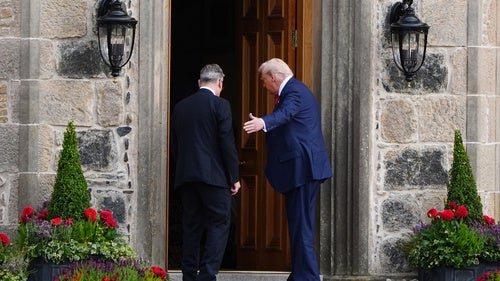Why Is the UK Distancing Itself from the US?

This week’s incidents speak to a growing, and concerning, trust deficit between the United States and its closest European ally.
This week, news broke that the United Kingdom has stopped sharing intelligence with the United States about suspected drug trafficking boats in the Caribbean. Sources told the media that UK officials were acting to protect the United Kingdom from becoming criminally liable in acts that they believe to be outside the bounds of international law.
The US military has destroyed 20 boats and killed 76 people since early September as part of the Trump administration’s campaign against alleged drug smuggling. While the White House claims the strikes were legal, UK officials appear to lack confidence in the assessment.
Intelligence sharing between the United States and United Kingdom is special, even when compared to the Five Eyes intelligence community that the two nations formed after World War II and now includes Australia, Canada, and New Zealand. The decision by the United Kingdom to withhold intelligence from its closest ally cannot be dismissed as part of the ordinary course of events.
In a related story, on Wednesday, we learned that Britain’s national security adviser, Jonathan Powell, had attempted earlier this year to form an independent back channel to the Kremlin. In this case, the decision was motivated by a fear that the United States would ignore Europe’s security interests and make an independent deal with Russian President Vladimir Putin on Ukraine. The memory of President Joe Biden’s chaotic withdrawal from Afghanistan is an ongoing reminder that even when the United Kingdom is a close partner of the United States, it may lack influence on critical foreign policy decisions.
The United Kingdom’s recent attempts to distance itself from its special relationship with the United States is noteworthy. UK Prime Minister Keir Starmer’s efforts to manage a close relationship with President Trump have been exceptional. Under his leadership, the United Kingdom became the first nation to reach an agreement on bilateral trade with the United States under Trump's “America First” tariffs. And during a trip to the White House, Starmer presented Trump with an “unprecedented” invitation from King Charles III to visit the United Kingdom for a second state visit, which Trump completed in September. Starmer has also worked closely with his European counterparts to prevent Trump from agreeing to a deal with Russia that would be inimical to Europe’s interests.
Given the history between the two nations and their leaders, this week’s incidents speak to a growing, and concerning, trust deficit between the United States and its closest European ally.
The problem of trust is, of course, endemic in international relations. US diplomats have worked tirelessly over the years to create mechanisms for overcoming international trust deficits to ensure smooth talks and negotiations on everything from arms control to trade, especially with adversaries. US President Ronald Reagan famously reminded US diplomats to “trust, but verify” during nuclear disarmament talks with the Soviet Union.
Now though, the trust deficit has become a problem for the United States and its closest allies and partners. In a March 2025 joint survey by Le Grand Continent and Cluster 17 that asked Europeans how much trust they have in 14 political leaders, Trump received the second-lowest confidence rating. The only leader to score lower was Putin.
This is not the first time a US president has been seen unfavorably in Europe. In the 2000s, European views of President George W. Bush plummeted following the 2003 invasion of Iraq and raised concerns about the future of the transatlantic relationship.
But the trust deficit in the US-UK relationship today is not simply a problem of poor public approval, nor an unfortunate byproduct of international relations. Trump’s diplomacy is designed to create uncertainty, rather than trust. Unsettling convention, evading rules, and ignoring international legal conventions are all tactics to disrupt the normal way of doing things and force change. US partners and allies are not exempt from this behavior.
"The lack of trust between the United States and its allies is not unprecedented. But today distrust is emerging as a core element of US strategy."
The Trump administration’s embrace of these tactics has, at times, paid off. Europe’s decision to invest more in its own defense may be driven more by America’s disruptive tactics than by Russia’s aggression. And the United States is getting better trade deals with some countries. But news of the United Kingdom’s go-it-alone approach underscores the potential for this strategy to go badly wrong.
The United Kingdom’s decision to withhold intelligence is significant because it holds the line on behavior it deems to be illegal. It has also chosen to do so despite the very real risk that Trump could retaliate against the United Kingdom. Just today, Trump’s border czar, Tom Homan, told reporters he does not think "the UK is a friend to this country and friend of the president."
Had the United Kingdom succeeded in their efforts to establish a separate line to Russia, it may have undermined Trump’s diplomacy. But it also played directly into Putin’s strategy, one that is premised on the ambition to divide the United States from its European allies.
What happens if US allies stop trying to manage their relationship with a disruptive United States and instead seek to carve out their own path? US allies in Europe and further afield have been working actively to do just this, by diversifying their partnerships and building internal resilience. But reducing decades of dependence on US largesse will not happen overnight.
The lack of trust between the United States and its allies is not unprecedented. But today distrust is emerging as a core element of US strategy. This may seem like a good strategy today, but if America’s partners and allies succeed in their effort to diversity their partnerships and build resilience, this could leave the United States isolated in the future.

